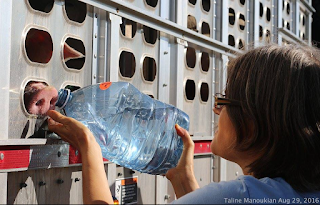by
Fireweed for the Island Word, SEPT. 2017 edition
 |
| BC declared a state of emergency on July 7th due to the wildfires |
“If
I look at the mass I will never act. If I look at the one, I will,”
said Mother Theresa. And indeed she hit the nail on the head when it
comes to our human capacity for a proactive response to overwhelming
crises. Paul
Slovic (University of Oregon) has spent decades researching
“the dance of affect and reason.” His work has shown that while
caring people will “exert great efforts to rescue 'the one' whose
needy plight comes to their attention,” the abstract nature of big
numbers fails to spark emotion or feeling and thus fails to motivate
action.
 |
| Cecil |
 |
| Ironically, farmed animals like these Texas cattle trapped by flood waters are major contributors to GHG emissions. |
While
no weather event can be blamed solely on human-driven warming, wrote
pro-vegan journalist George Monbiot recently, “none is
unaffected by it.” If we are as concerned as we should be about the
increasing frequency of deadly storms and frightening temperature
extremes it surely behooves us to recognize, as Monbiot has, that the
power of our food choices has a very significant role to play.
Switching to a whole foods vegan diet is one of the most immediate
ways those of us with the privilege of choice can help reduce
GHG emissions. So what on earth are we waiting for?
 |
| Houston, 08/28/17 Jonathan Bachman/Rueters photo |
 |
| Penny
jumped off of a truck bound for the
slaughterhouse
in Saskatchewan. Now she's
busy
winning hearts and turning visitors vegan
at RASTA Sanctuary
in Chemainus. 💜 |
To support Food Not Bombs in delivering vegan food to folks struggling after the floods in Texas, please consider donating through A Well Fed World and maybe even double your donation. See here for details! www.awfw.org
What
would the end of summer be like without an abundance of juicy ripe
tomatoes? I don't ever want to know. Here is a
traditional Tuscan recipe I hope you'll enjoy!
Panzanella (thx to D. Mele for this tasty
version!)
 |
| garden toms - photo by Fireweed |
Ingredients:
1
pound loaf of day old country style bread
1
pound ripe tomatoes cut into chunks
1
large sweet onion, thinly sliced (about 1 cup)
3
medium cloves garlic, finely minced (about 1 T.)
2
celery stalks, finely chopped (about 3/4 cup)
1/2
cup chopped fresh celery leaves
1.5
cup chopped drained marinated artichokes
1/4
cup pitted, halved olives
3
T. chopped capers
1/4
cup chopped fresh parsley
10
fresh basil leaves, roughly torn into pieces
1/4
cup red wine vinegar
1/3 cup
extra virgin olive oil
sea
salt and fresh ground black pepper to taste
Directions:
Cut or tear the stale bread into 1.5 inch chunks. Fill a large bowl with cool water and dunk the bread into it until just barely wet through. Squeeze the water out of the bread chunks immediately with your hand and place in a large serving bowl. Add the vegetables and toss. In a smaller bowl whisk together the olive oil, vinegar and salt and pepper. Pour the dressing over your salad, toss again, correct seasoning and serve. Buon appetito!
Cut or tear the stale bread into 1.5 inch chunks. Fill a large bowl with cool water and dunk the bread into it until just barely wet through. Squeeze the water out of the bread chunks immediately with your hand and place in a large serving bowl. Add the vegetables and toss. In a smaller bowl whisk together the olive oil, vinegar and salt and pepper. Pour the dressing over your salad, toss again, correct seasoning and serve. Buon appetito!
 |
| A Well Fed World: Nourishing People, Helping Animals |




















